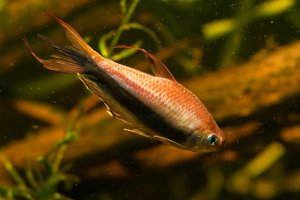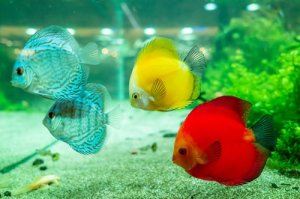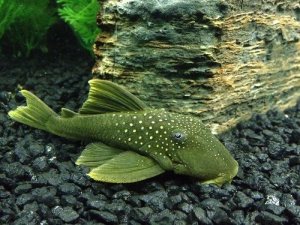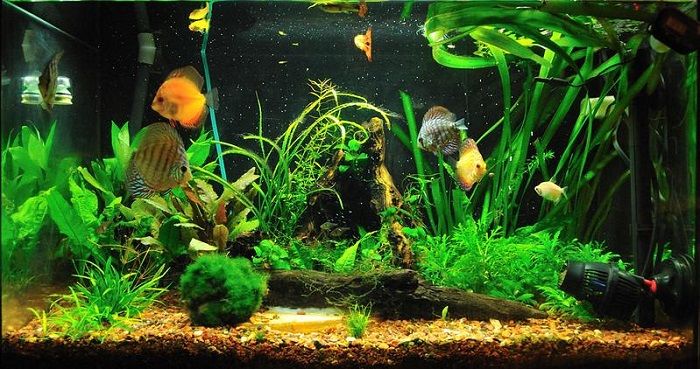
The King of the Aquarium, as they are known, is a calm, peaceful fish with its own unique patterns. They are generally excellent additions to any aquarium, but their preferred living conditions is what makes their tankmate selection a little more challenging. Discus tank mates need to essentially be able to handle the same water conditions as discus. Therefore, it is necessary for discus owners to take these conditions into consideration, especially if you want your discus and other species to thrive.
In this article, you will find a list of the most compatible discus tank mates to assist in finding suitable species for your tank.
How To Find Compatible Discus Tank Mates
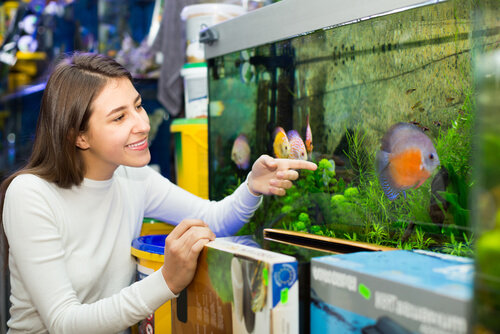
1. Temperament
Discus fish are innately shy, reserved, and timid. As a result, they should be surrounded by a tranquil school of discus tank mates. Unfortunately, they can easily become stressed by aggressive, restless, or territorial tank mates. Avoid choosing tank mates for your discus fish that could end up bullying them at all costs. Discus will never be aggressive to other species. You will only see aggression toward their own species.
2. Tank Size
Discus fish prefer little schooling fish in a nicely sized aquarium. The tank needs to be big enough to comfortably house all the fish you intend to keep. Your tank size will primarily be determined by the size and number of fish you place in it. Take these into consideration when purchasing a tank. A tank that is too small will be overcrowded with too many fish. Therefore, this can cause stress and illness for all the fish in the tank.
3. Competition
Discus are generally slow eaters, so it is crucial that you limit competition for food. It’s also vital to consider discus fish tank mates who won’t become territorial or outcompete them for food. Bottom feeders are usually best to pair as tank mates as they don’t interfere with discus feeding. Smaller fish like tetras are typically excellent picks as they eat very little and will not disrupt how much your discus gets.
4. Water Parameters
Because they are not like your conventional tropical freshwater fish, discus fish require the best tank conditions and care. Discus prefer their aquarium water to be much warmer than most other species because they naturally live in warm waters in the Amazon basin. Water at 80-86 degrees Fahrenheit and a pH level that sits at 6.0-7.0 is what they prefer. When searching for compatible discus tank mates, always aim for those that can withstand similar conditions.
8 Favoured Discus Tank Mates
1. Corydoras Sterbai
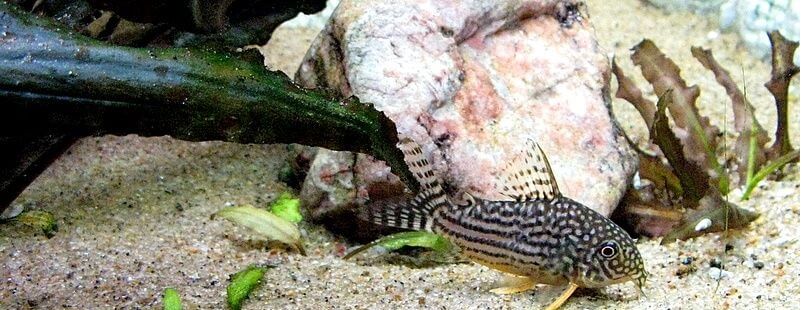
Due to a number of factors, corydoras sterbai are among the most compatible discus tank mates. Also known as cory sterba’s, they live in a separate water layer to discus fish. They are bottom feeders and enjoy combing through the substrate to find any lovely treats your discus may have missed.
Corydoras sterbai are one of the few cory catfish species that originate from the same region as the discus. This is a benefit as they do well in warmer waters that Discus prefers. Cory catfish have a long lifespan of 15 to 20 years and can grow to be around 2.5 inches long. Keeping them in groups of six is recommended to help them feel comfortable in your aquarium.
2. Marbled Hatchetfish
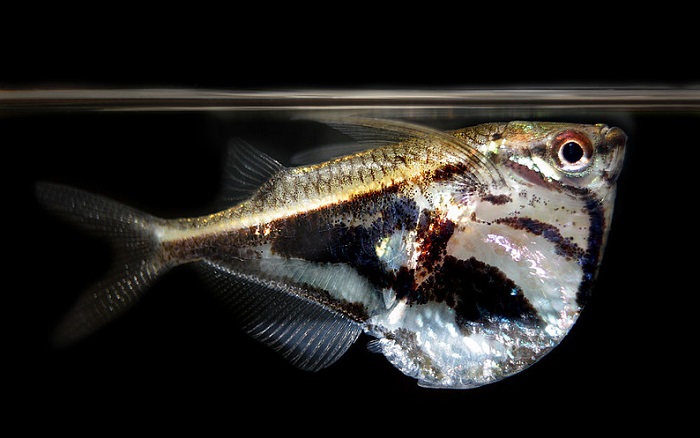
Marbled hatchetfish are also bottom feeders who are remarkably calm and hardly ever leave the surface. You’ll have to think outside the box with decorations to please both discus fish and hatchetfish. Discus fish prefer a lot of open swimming room, whereas marbled hatchetfish prefer overhanging flora. The hatchetfish can benefit significantly from floating plants to help them feel secure.
Marbled hachetfish are prone to jumping, especially when startled. You might want to avoid keeping this species if your aquarium doesn’t have a lid. Try to keep these fish in groups of 10 as they tend to thrive in groups of this size.
3. German Ram
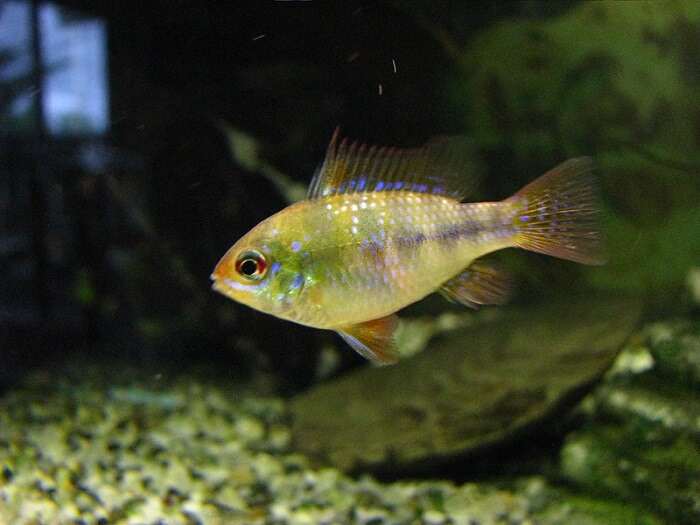
Consider adding a few German rams to your aquarium if you want to give it a little more color and want compatible discus tank mates. Generally speaking, these dwarf cichlids that grow to about 2-3 inches get along with discus rather well. However, rams prefer swimming in the open and do like to claim their own territory.
Always provide plenty of hiding places amid the vegetation to make it feel at ease. In addition, add rocks and ornaments to the tank as a hiding place for these aquatic creatures. German rams should be kept in pairs as they can be very territorial, especially during the breeding season.
4. Siamese Algae Eater
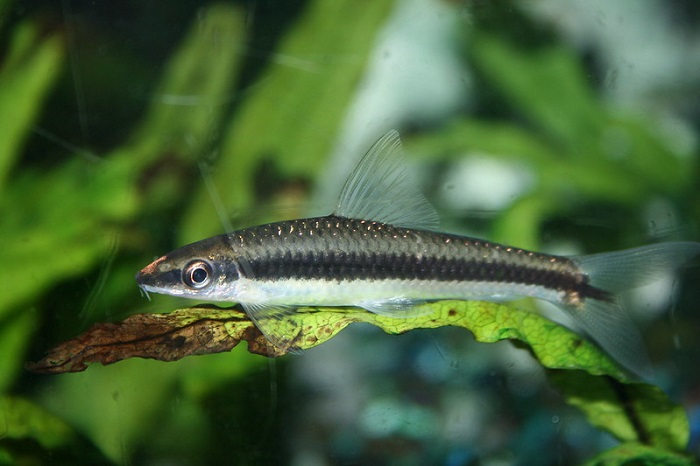
The Siamese algae eaters are indigenous to Southeast Asia’s continent and are part of the Cyprinidae family. At full size, they can grow up to six inches in length. These distinctive fish have transparent bodies and a single stripe right in front of their eyes.
Siamese algae eaters don’t compete with discus as they prefer the bottom of the tank and feed on algae. These aquatic pets are not confrontational and territorial, like many other bottom dwellers. As discus fish tank mates, they are an excellent match in terms of water temperature preference. They thrive in water with temperatures of 72-82 degrees Fahrenheit.
5. Rummy Nose Tetra
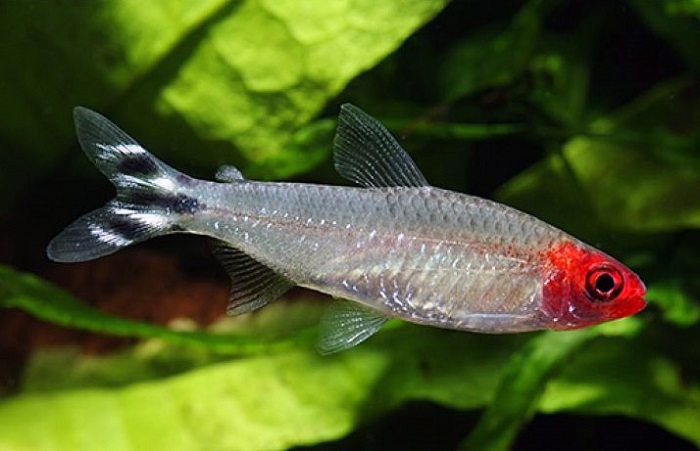
It’s not surprising that rummy nose tetras have grown to be so well-liked discus tank mates, given their peaceful temperament. In addition, rummies have a unique look that makes them very recognizable in your tank. From their eye-catching red heads to the vibrant black and white stripes on their tail fins, these fish will add that much-needed color to your tank.
They are small fish about 2 inches in length that prefer warmer temperatures, making them perfect for the discus tank. Rummy nose tetras are omnivores who live about 5-6 years. Their diet requirements are similar to discus feeding, but they are bottom feeders, so they won’t be competing with your discus for food.
6. Beckford’s Pencilfish
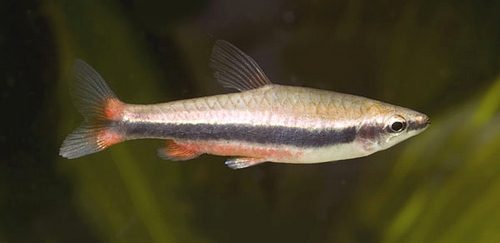
These timid little pencilfish like to hang out with other small species in aquariums. Like discus, Beckford’s pencilfish enjoy an aquarium with lots of driftwood and some floating plants for additional shelter. They are compatible discus tank mates as they are not picky eaters that consume really small portions and aren’t any competition when it comes to food.
Pencilfish thrive in the lower-end Discus preferred temperatures. They can live perfectly in temperatures of 72-79 degrees Fahrenheit. Keeping these aquatic creatures in big groups is ideal as they feel safer in large groups of their own species.
7. Rainbow Fish
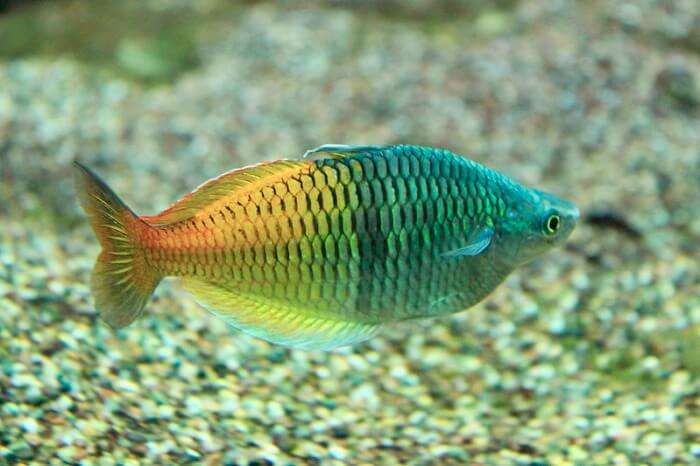
Beautiful rainbow fish that are relaxed and tame make excellent discus fish tank mates, given their temperament and the water conditions they prefer. Rainbow fish like to live in huge groups of more than five. This helps keep their stress levels lower and helps improve their overall happiness levels.
These beautiful aquatic pets prefer tanks at warmer water temperatures between 76-82 degrees Fahrenheit. A tank size of 30 gallons is recommended for a healthy space for both rainbow fish and discus.
8. Harlequin Rasbora
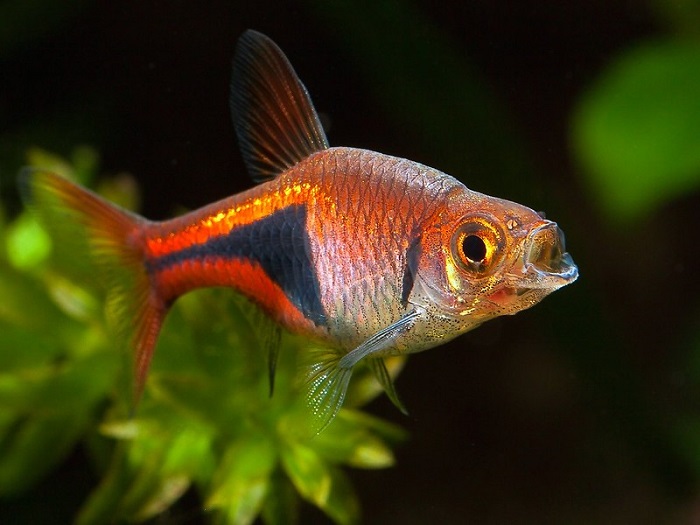
The harlequin rasbora is a distinguishably marked aquarium addition that is quite popular among domestic fish lovers. The attractive and calm harlequin rasbora – also known as red rasbora – is a type of fish native to Sumatra, Singapore, and some regions of Thailand. They reach a length of around two inches and live for about six years.
Ideal temperatures for harlequins are between 73 to 82 degrees Fahrenheit. They make perfect discus tank mates as their ideal water conditions are soft and acidic. These fish do well in community tanks as they are schooling fish. To help them thrive, have a few of their species together in one tank.
In The End
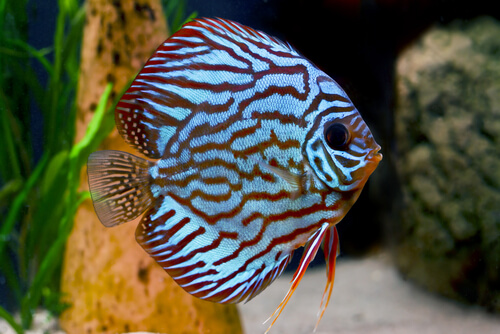
When you have a discus tank, you need to know that water temperature is not the only thing to consider. Discus fish tank mates should also display similar temperaments, not be larger than the discus, and should not compete with your discus for food. If your tank is filled with other species that complement your discus, you are likely to have a well-balanced community tank. With these in check, your fish won’t be stressed or get ill from the situation.


